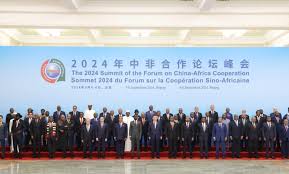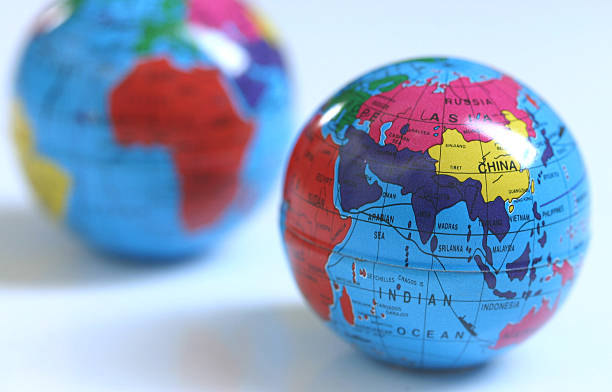In September 2024, Beijing was once again the center of global attention as it hosted the ninth Forum on China-Africa Cooperation (FOCAC) Summit. With over 50 African heads of state and government present, the event marked a significant moment in the ongoing relationship between China and Africa. Historically, FOCAC has been viewed through the lens of China’s growing economic interests on the continent, but the 2024 summit offered fresh insights into the evolving dynamics of this partnership. Dr. Cliff Mboya, an expert in international relations, takes us through the key takeaways from the summit and what they mean for Africa’s future, particularly in light of the changing geopolitical landscape.
A Changing Landscape for China-Africa Relations
Over the past few years, China-Africa relations have faced a series of challenges. The narrative surrounding FOCAC 2024 was shaped by a backdrop of declining Chinese investment in Africa, concerns over rising debt levels in several African nations, and the broader geopolitical uncertainties that have affected global markets. As China’s economic growth has slowed in recent years, there was significant concern that the once booming relationship between China and Africa might be heading into a period of stagnation.
The data seemed to support this pessimistic outlook. According to research by the Global Development Policy Center at Boston University, China’s lending to Africa has been on a steady decline since 2016. While there was a slight increase in loans and investments last year, the figures were far from the high levels seen in the early 2010s. In 2015, China pledged a historic $60 billion in investments to Africa during the FOCAC summit, but that figure dropped to $40 billion by 2021.
Against this backdrop, expectations for the 2024 FOCAC summit were subdued. Many analysts speculated that the forum would be more symbolic than substantive, with both sides struggling to meet the lofty promises made in previous years. However, the outcome was more optimistic than anticipated, with 51 African leaders participating, signaling that Africa remains committed to its partnership with China, despite the challenges.
The African Perspective: Optimism Amidst Concerns
From Africa’s perspective, the FOCAC summit was seen as an opportunity to address several key issues that have emerged in recent years. One of the most prominent concerns was the economic imbalance in the relationship. While China has been a major driver of infrastructure development across Africa, many African leaders have voiced frustration over the unbalanced nature of trade and investment. African nations, despite their vast natural resources, continue to see a large trade deficit with China, and many are eager for more equitable partnerships that will help generate jobs, create local industries, and reduce dependency on external debt.
This sentiment was echoed throughout the summit, as African leaders pushed for a more balanced approach to the China-Africa relationship. There was a clear call for more investments in sectors such as agriculture, technology, and industry, with a particular emphasis on creating jobs and improving the livelihoods of ordinary Africans. Political support was also a key topic, with several African leaders advocating for China’s continued backing of Africa’s goals in global governance, particularly in the context of the African Union’s push for a permanent seat at the G20 table.
Key Outcomes of the Summit: A Financial Commitment for the Future
One of the most significant outcomes of the FOCAC summit was China’s pledge to invest $50.7 billion in Africa over the next three years. This pledge marked a departure from the trend of declining investments and signaled China’s commitment to supporting Africa’s growth in critical sectors such as agriculture, technology, industry, and trade. The focus on these areas aligns with Africa’s long-term development goals, as outlined in the African Union’s Agenda 2063, which seeks to promote sustainable economic growth, industrialization, and innovation across the continent.
China’s financial commitment, while notable, comes with the recognition that Africa must play a more active role in the partnership. The summit emphasized the importance of mutual cooperation, with a strong focus on African ownership of projects. This is a significant shift in tone from previous FOCAC summits, where China’s role was often seen as the primary driver of development.
Another key takeaway from the summit was the reaffirmation of China’s support for the African Union (AU). China has consistently backed the AU’s ambitions, including its push for greater influence in global decision-making forums. The AU’s growing role in global governance was a recurring theme at the summit, with several African leaders urging China to continue supporting Africa’s voice in the international community. In particular, China’s backing of the AU’s bid for a permanent seat at the G20 was seen as a major diplomatic victory for the continent.
The Geopolitical Implications: A Shift in the Balance of Power
Beyond the immediate outcomes of the summit, FOCAC 2024 also carried significant geopolitical implications. The summit highlighted the growing importance of China as a strategic partner for Africa in the global political landscape. As China’s influence in Africa continues to grow, it has the potential to reshape the continent’s position in global geopolitics. The relationship between China and Africa is increasingly being seen as a counterbalance to the influence of Western powers, particularly the United States and the European Union, which have historically been dominant players in Africa’s development.
The timing of FOCAC 2024 is particularly significant, as the world is witnessing a shift in the global order. China, with its Belt and Road Initiative (BRI) and growing economic clout, is positioning itself as a global leader in shaping the future of trade, technology, and infrastructure development. For Africa, the opportunity to align with China in this changing geopolitical environment presents both challenges and opportunities. On one hand, China’s investments have the potential to drive economic growth and development across the continent. On the other hand, the growing influence of China raises concerns about debt sustainability and the potential for Africa to become overly reliant on Chinese capital.
The European Union, in particular, is likely to face pressure to recalibrate its approach to Africa’s development priorities. As China continues to expand its footprint on the continent, European powers may need to reconsider their strategies for engaging with Africa, especially as Africa’s economic power continues to grow.
A New Chapter in Africa-China Relations
As the dust settles after the ninth FOCAC summit, it is clear that the China-Africa relationship is entering a new phase. The summit in Beijing reaffirmed the mutual benefits of the partnership, with China making a significant financial commitment to Africa’s development. While challenges remain, particularly in terms of balancing trade and addressing debt concerns, the summit provided an opportunity for African leaders to push for a more balanced and equitable relationship with China.
For Africa, FOCAC 2024 represents a new chapter in its ongoing engagement with China—a chapter that holds the promise of greater cooperation, job creation, and long-term economic development. As Africa continues to navigate the complex geopolitics of its partnerships, the lessons learned from FOCAC 2024 will shape the continent’s future interactions with both China and the rest of the world. With over 50 African leaders coming together in Beijing, it is clear that Africa is optimistic about the future of its relationship with China—and that the partnership will continue to evolve in the years to come.





